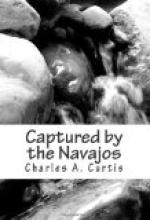I returned to my own tent and went to bed. Placing two candles on a support near my pillow, I tucked the lower edge of the mosquito-bar under the edge of my mattress, and, settling back comfortably, proceeded to read the last instalment of news from “the States”—news which had been fifteen days on the way from the Missouri. As I read of battle, siege, and march I was conscious that the boys were having some difficulty in inducing Vic to remain with them. When at last all was quiet, except their regular and restful breathing, a soft nose was thrust up to my pillow, and I opened an aperture in the netting large enough to exchange affectionate greetings, and Vic cuddled down on her bed beside mine and went to sleep. This was always her custom thereafter. While she was very fond of the boys, and spent most of her waking hours with them, no persuasion or blandishments could prevent her, when she knew the boys had dropped into unconsciousness, from returning to my tent, offering me a good-night assurance of her unchanged affection, and going to sleep upon her old bed.
The time had now come for us to begin our march to Arizona. Company F had arrived, and the boy corporals were again in possession of their beautiful horses. Grain, hay, and careful attendance had put new graces into the ponies’ shapes, and kind treatment had developed in each a warm attachment for its young master.
The first day of our march was spent in crossing the Rio Grande del Norte and making camp four miles beyond the opposite landing. There was a ferry-boat at Los Pinos, operated by the soldiers of the post, capable of taking over four wagons at a time.
We rose at an earlier hour than usual, and by daybreak our train of eighty-nine wagons, drawn by five hundred and thirty-four mules, was on its way to the river. The two boy corporals joined me as I followed the last wagon. Mounted on their handsome animals, with carbines on their right hips, revolvers in their belts, portmanteaus behind their saddles, and saddle-pouches on each side, they were, indeed, very warlike in appearance.
The two detachments of cavalry and their officers, accompanied by a paymaster and a surgeon, proceeded at once to the river, crossed and went into camp, leaving the infantry and its officers to perform the labor of transferring, from one shore to the other, wagons and mules, a herd of three hundred beef cattle, and a flock of eight hundred sheep. The boy corporals also remained behind to act as messengers, should any be required.
Mules and oxen swam the stream, but the sheep were boated across. On the last trip over our attention was attracted by a sudden shouting up-stream, followed by a rapid discharge of fire-arms. In the river, less than a quarter of a mile distant, were several objects making their way towards the western shore. When near the bank, and in shoaling water, we saw the objects rise, until three Indians and three ponies stood revealed. As soon as they reached the shore the men sprang into their saddles and rode rapidly away.




